An Essay on the Importance of Hypotheses in Research Design
VerifiedAdded on 2021/09/14
|5
|977
|143
Essay
AI Summary
This essay explores the critical role of hypotheses in research design. It defines hypotheses as tentative explanations guiding research, differentiating between null and alternative hypotheses. The essay emphasizes that hypotheses provide direction, focus, and a link between existing literature and the current study. It highlights their role in data collection, analysis, and the formulation of theories, principles, and laws. The essay stresses that hypotheses prevent unfocused research and ensure the collection of relevant data, saving time and resources. In conclusion, the essay underscores the integral role of hypotheses in the research process, advocating for their essentiality in all research studies to guide researchers through data collection, analysis, and interpretation of findings.
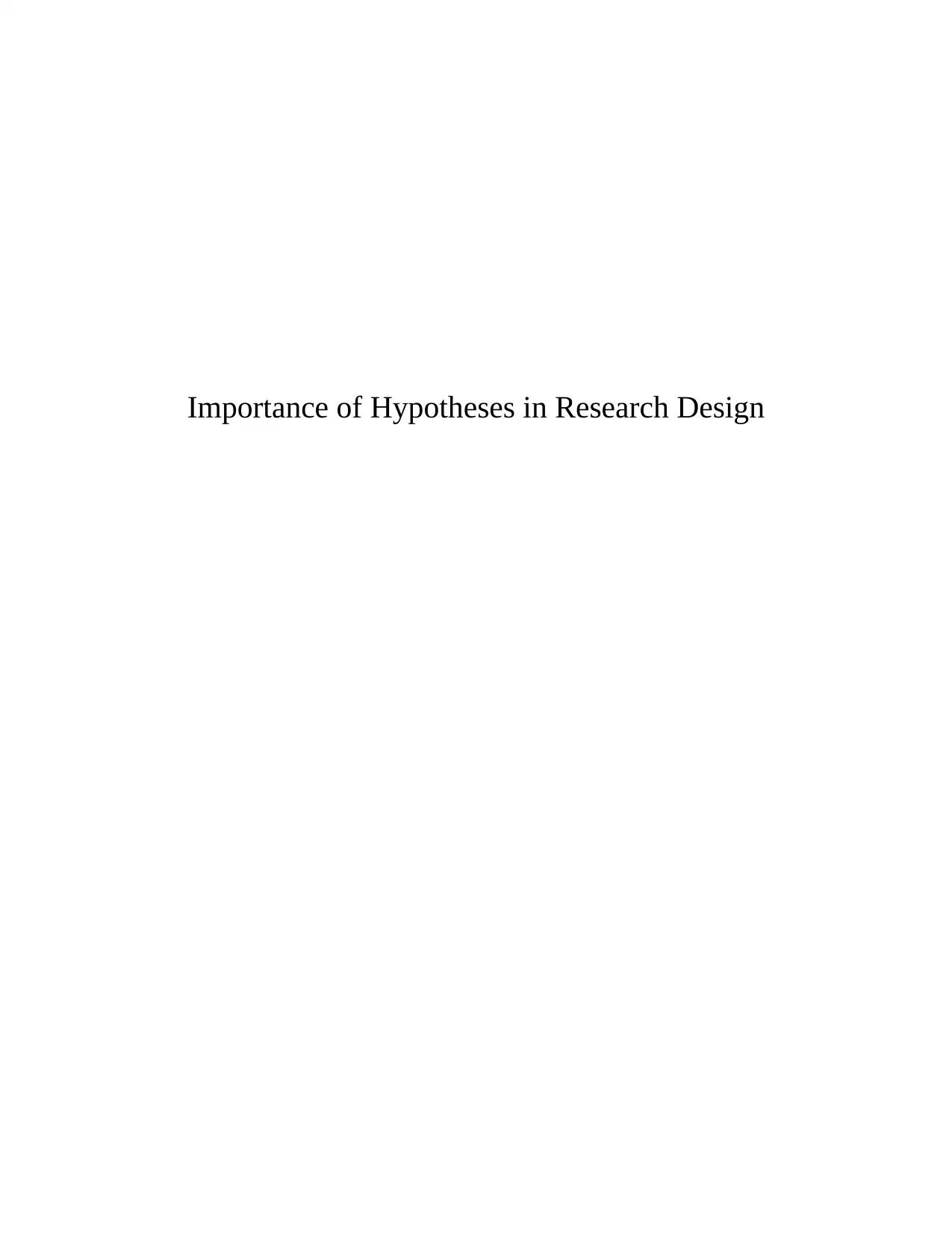
Importance of Hypotheses in Research Design
Paraphrase This Document
Need a fresh take? Get an instant paraphrase of this document with our AI Paraphraser
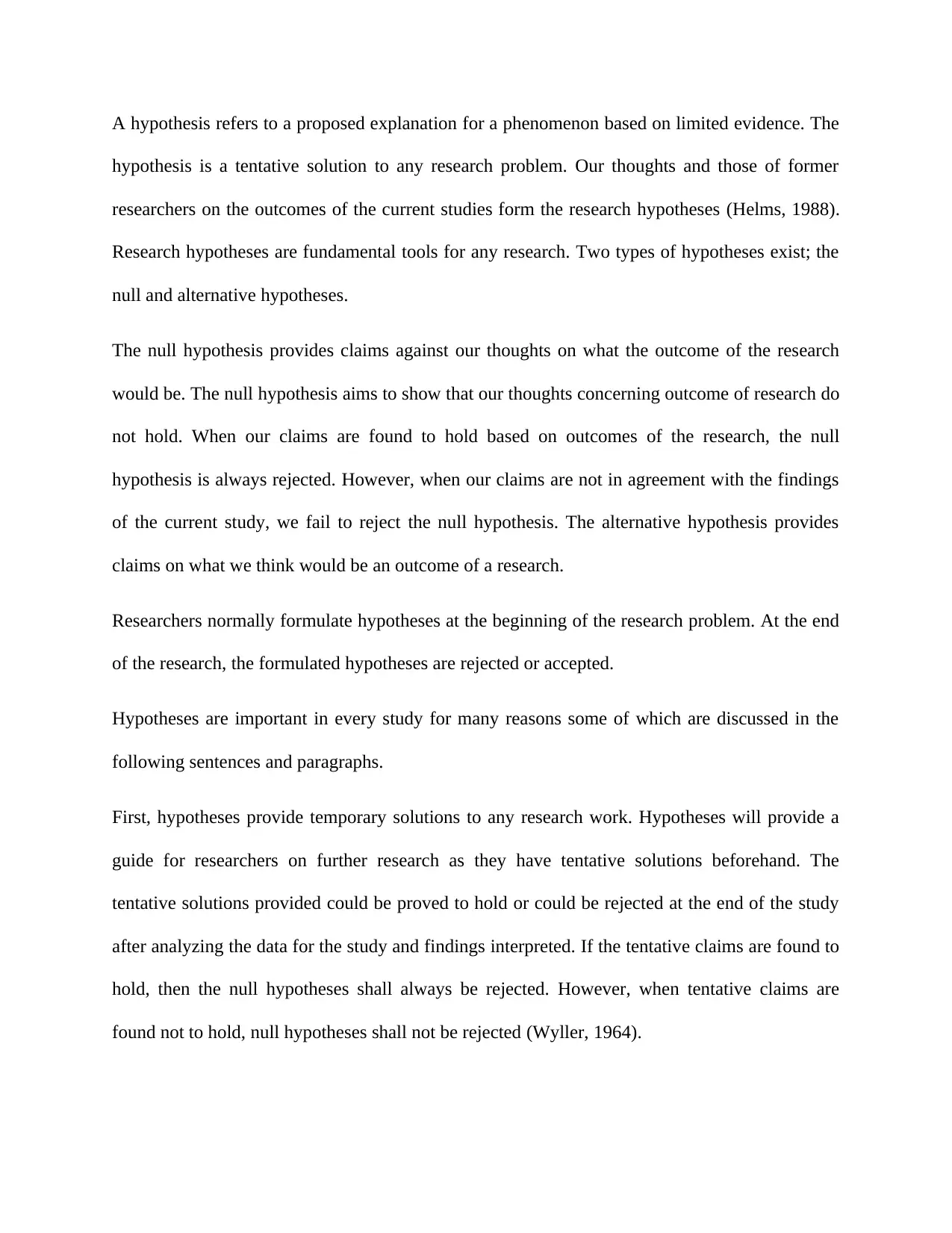
A hypothesis refers to a proposed explanation for a phenomenon based on limited evidence. The
hypothesis is a tentative solution to any research problem. Our thoughts and those of former
researchers on the outcomes of the current studies form the research hypotheses (Helms, 1988).
Research hypotheses are fundamental tools for any research. Two types of hypotheses exist; the
null and alternative hypotheses.
The null hypothesis provides claims against our thoughts on what the outcome of the research
would be. The null hypothesis aims to show that our thoughts concerning outcome of research do
not hold. When our claims are found to hold based on outcomes of the research, the null
hypothesis is always rejected. However, when our claims are not in agreement with the findings
of the current study, we fail to reject the null hypothesis. The alternative hypothesis provides
claims on what we think would be an outcome of a research.
Researchers normally formulate hypotheses at the beginning of the research problem. At the end
of the research, the formulated hypotheses are rejected or accepted.
Hypotheses are important in every study for many reasons some of which are discussed in the
following sentences and paragraphs.
First, hypotheses provide temporary solutions to any research work. Hypotheses will provide a
guide for researchers on further research as they have tentative solutions beforehand. The
tentative solutions provided could be proved to hold or could be rejected at the end of the study
after analyzing the data for the study and findings interpreted. If the tentative claims are found to
hold, then the null hypotheses shall always be rejected. However, when tentative claims are
found not to hold, null hypotheses shall not be rejected (Wyller, 1964).
hypothesis is a tentative solution to any research problem. Our thoughts and those of former
researchers on the outcomes of the current studies form the research hypotheses (Helms, 1988).
Research hypotheses are fundamental tools for any research. Two types of hypotheses exist; the
null and alternative hypotheses.
The null hypothesis provides claims against our thoughts on what the outcome of the research
would be. The null hypothesis aims to show that our thoughts concerning outcome of research do
not hold. When our claims are found to hold based on outcomes of the research, the null
hypothesis is always rejected. However, when our claims are not in agreement with the findings
of the current study, we fail to reject the null hypothesis. The alternative hypothesis provides
claims on what we think would be an outcome of a research.
Researchers normally formulate hypotheses at the beginning of the research problem. At the end
of the research, the formulated hypotheses are rejected or accepted.
Hypotheses are important in every study for many reasons some of which are discussed in the
following sentences and paragraphs.
First, hypotheses provide temporary solutions to any research work. Hypotheses will provide a
guide for researchers on further research as they have tentative solutions beforehand. The
tentative solutions provided could be proved to hold or could be rejected at the end of the study
after analyzing the data for the study and findings interpreted. If the tentative claims are found to
hold, then the null hypotheses shall always be rejected. However, when tentative claims are
found not to hold, null hypotheses shall not be rejected (Wyller, 1964).
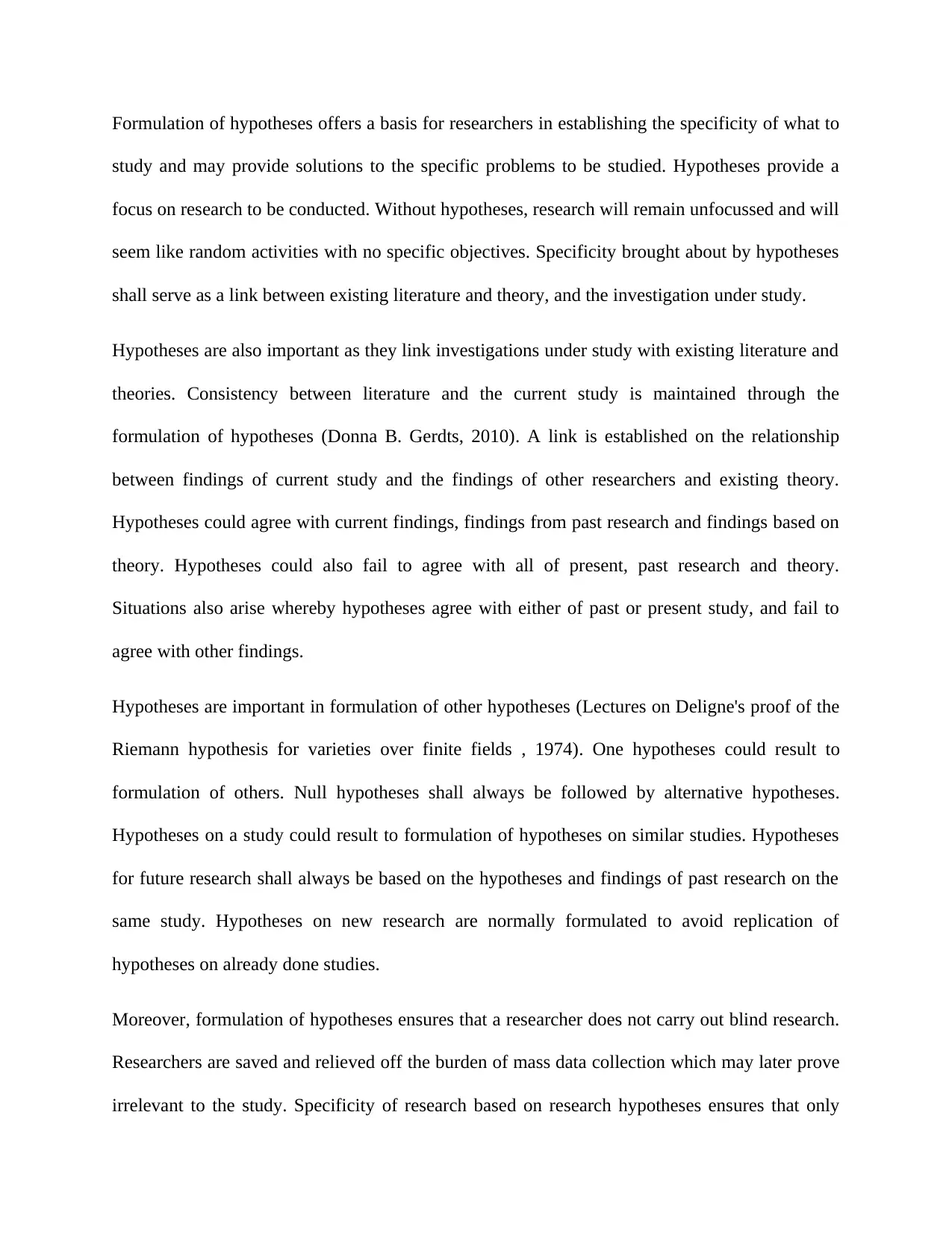
Formulation of hypotheses offers a basis for researchers in establishing the specificity of what to
study and may provide solutions to the specific problems to be studied. Hypotheses provide a
focus on research to be conducted. Without hypotheses, research will remain unfocussed and will
seem like random activities with no specific objectives. Specificity brought about by hypotheses
shall serve as a link between existing literature and theory, and the investigation under study.
Hypotheses are also important as they link investigations under study with existing literature and
theories. Consistency between literature and the current study is maintained through the
formulation of hypotheses (Donna B. Gerdts, 2010). A link is established on the relationship
between findings of current study and the findings of other researchers and existing theory.
Hypotheses could agree with current findings, findings from past research and findings based on
theory. Hypotheses could also fail to agree with all of present, past research and theory.
Situations also arise whereby hypotheses agree with either of past or present study, and fail to
agree with other findings.
Hypotheses are important in formulation of other hypotheses (Lectures on Deligne's proof of the
Riemann hypothesis for varieties over finite fields , 1974). One hypotheses could result to
formulation of others. Null hypotheses shall always be followed by alternative hypotheses.
Hypotheses on a study could result to formulation of hypotheses on similar studies. Hypotheses
for future research shall always be based on the hypotheses and findings of past research on the
same study. Hypotheses on new research are normally formulated to avoid replication of
hypotheses on already done studies.
Moreover, formulation of hypotheses ensures that a researcher does not carry out blind research.
Researchers are saved and relieved off the burden of mass data collection which may later prove
irrelevant to the study. Specificity of research based on research hypotheses ensures that only
study and may provide solutions to the specific problems to be studied. Hypotheses provide a
focus on research to be conducted. Without hypotheses, research will remain unfocussed and will
seem like random activities with no specific objectives. Specificity brought about by hypotheses
shall serve as a link between existing literature and theory, and the investigation under study.
Hypotheses are also important as they link investigations under study with existing literature and
theories. Consistency between literature and the current study is maintained through the
formulation of hypotheses (Donna B. Gerdts, 2010). A link is established on the relationship
between findings of current study and the findings of other researchers and existing theory.
Hypotheses could agree with current findings, findings from past research and findings based on
theory. Hypotheses could also fail to agree with all of present, past research and theory.
Situations also arise whereby hypotheses agree with either of past or present study, and fail to
agree with other findings.
Hypotheses are important in formulation of other hypotheses (Lectures on Deligne's proof of the
Riemann hypothesis for varieties over finite fields , 1974). One hypotheses could result to
formulation of others. Null hypotheses shall always be followed by alternative hypotheses.
Hypotheses on a study could result to formulation of hypotheses on similar studies. Hypotheses
for future research shall always be based on the hypotheses and findings of past research on the
same study. Hypotheses on new research are normally formulated to avoid replication of
hypotheses on already done studies.
Moreover, formulation of hypotheses ensures that a researcher does not carry out blind research.
Researchers are saved and relieved off the burden of mass data collection which may later prove
irrelevant to the study. Specificity of research based on research hypotheses ensures that only
⊘ This is a preview!⊘
Do you want full access?
Subscribe today to unlock all pages.

Trusted by 1+ million students worldwide
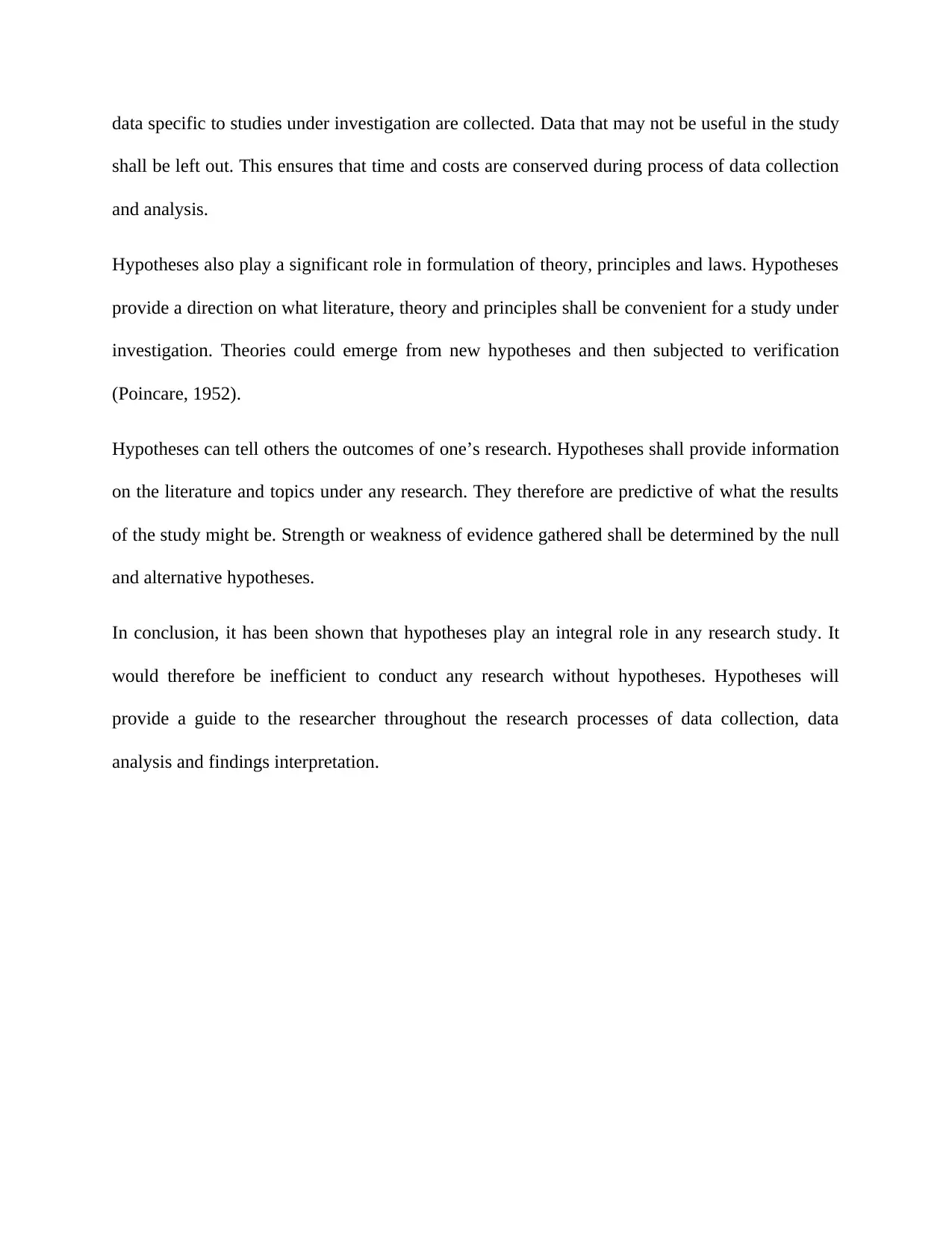
data specific to studies under investigation are collected. Data that may not be useful in the study
shall be left out. This ensures that time and costs are conserved during process of data collection
and analysis.
Hypotheses also play a significant role in formulation of theory, principles and laws. Hypotheses
provide a direction on what literature, theory and principles shall be convenient for a study under
investigation. Theories could emerge from new hypotheses and then subjected to verification
(Poincare, 1952).
Hypotheses can tell others the outcomes of one’s research. Hypotheses shall provide information
on the literature and topics under any research. They therefore are predictive of what the results
of the study might be. Strength or weakness of evidence gathered shall be determined by the null
and alternative hypotheses.
In conclusion, it has been shown that hypotheses play an integral role in any research study. It
would therefore be inefficient to conduct any research without hypotheses. Hypotheses will
provide a guide to the researcher throughout the research processes of data collection, data
analysis and findings interpretation.
shall be left out. This ensures that time and costs are conserved during process of data collection
and analysis.
Hypotheses also play a significant role in formulation of theory, principles and laws. Hypotheses
provide a direction on what literature, theory and principles shall be convenient for a study under
investigation. Theories could emerge from new hypotheses and then subjected to verification
(Poincare, 1952).
Hypotheses can tell others the outcomes of one’s research. Hypotheses shall provide information
on the literature and topics under any research. They therefore are predictive of what the results
of the study might be. Strength or weakness of evidence gathered shall be determined by the null
and alternative hypotheses.
In conclusion, it has been shown that hypotheses play an integral role in any research study. It
would therefore be inefficient to conduct any research without hypotheses. Hypotheses will
provide a guide to the researcher throughout the research processes of data collection, data
analysis and findings interpretation.
Paraphrase This Document
Need a fresh take? Get an instant paraphrase of this document with our AI Paraphraser
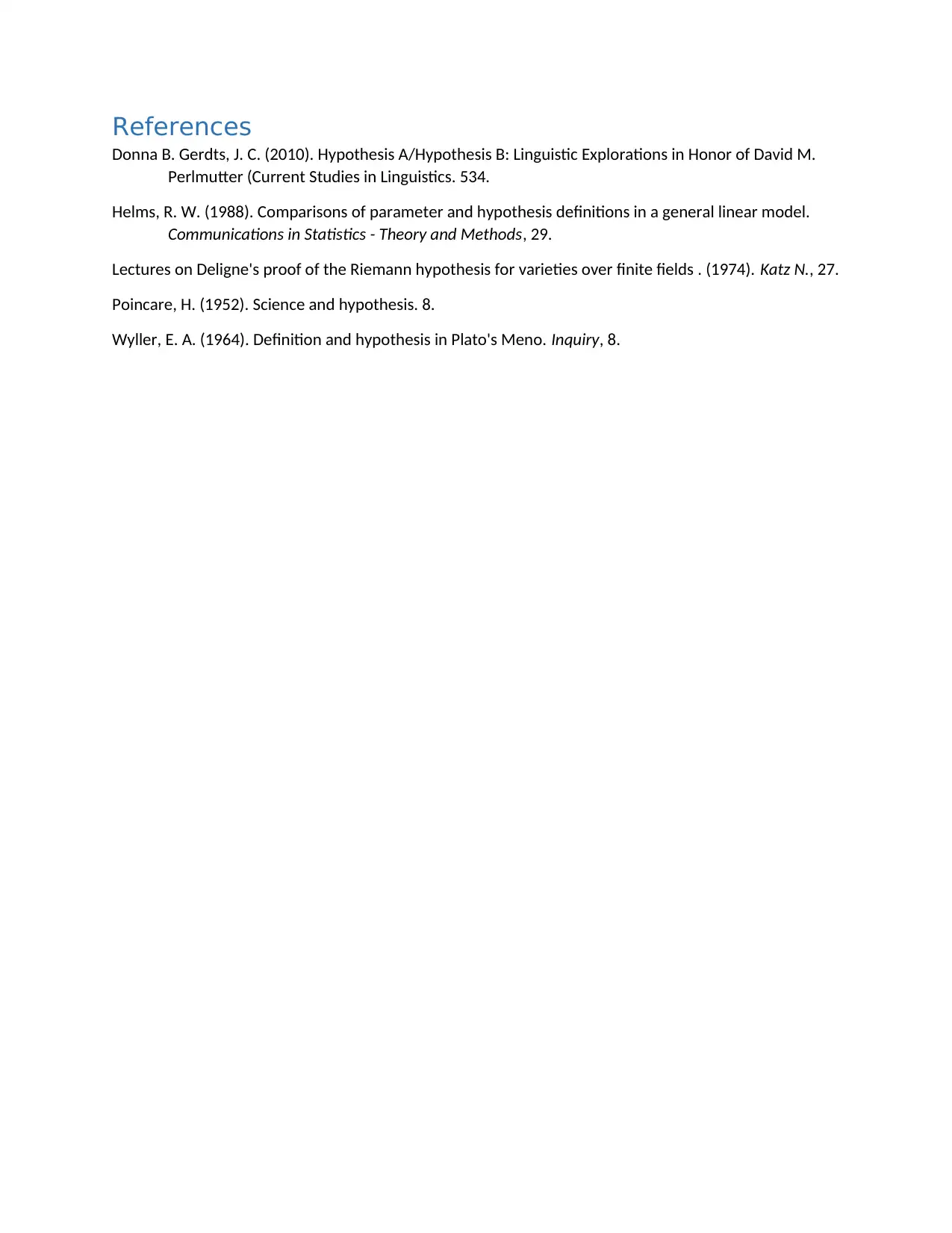
References
Donna B. Gerdts, J. C. (2010). Hypothesis A/Hypothesis B: Linguistic Explorations in Honor of David M.
Perlmutter (Current Studies in Linguistics. 534.
Helms, R. W. (1988). Comparisons of parameter and hypothesis definitions in a general linear model.
Communications in Statistics - Theory and Methods, 29.
Lectures on Deligne's proof of the Riemann hypothesis for varieties over finite fields . (1974). Katz N., 27.
Poincare, H. (1952). Science and hypothesis. 8.
Wyller, E. A. (1964). Definition and hypothesis in Plato's Meno. Inquiry, 8.
Donna B. Gerdts, J. C. (2010). Hypothesis A/Hypothesis B: Linguistic Explorations in Honor of David M.
Perlmutter (Current Studies in Linguistics. 534.
Helms, R. W. (1988). Comparisons of parameter and hypothesis definitions in a general linear model.
Communications in Statistics - Theory and Methods, 29.
Lectures on Deligne's proof of the Riemann hypothesis for varieties over finite fields . (1974). Katz N., 27.
Poincare, H. (1952). Science and hypothesis. 8.
Wyller, E. A. (1964). Definition and hypothesis in Plato's Meno. Inquiry, 8.
1 out of 5
Related Documents
Your All-in-One AI-Powered Toolkit for Academic Success.
+13062052269
info@desklib.com
Available 24*7 on WhatsApp / Email
![[object Object]](/_next/static/media/star-bottom.7253800d.svg)
Unlock your academic potential
Copyright © 2020–2025 A2Z Services. All Rights Reserved. Developed and managed by ZUCOL.



